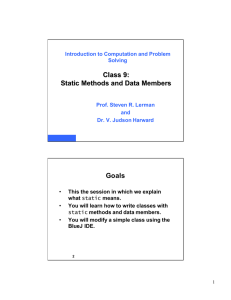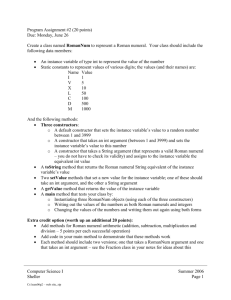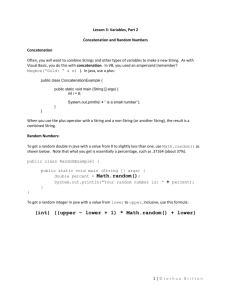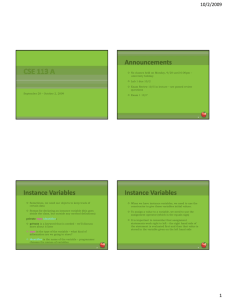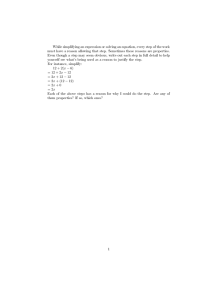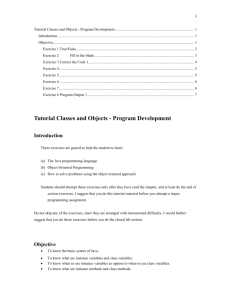Class 9: Static Methods and Data Members Announcements/Reminders
advertisement
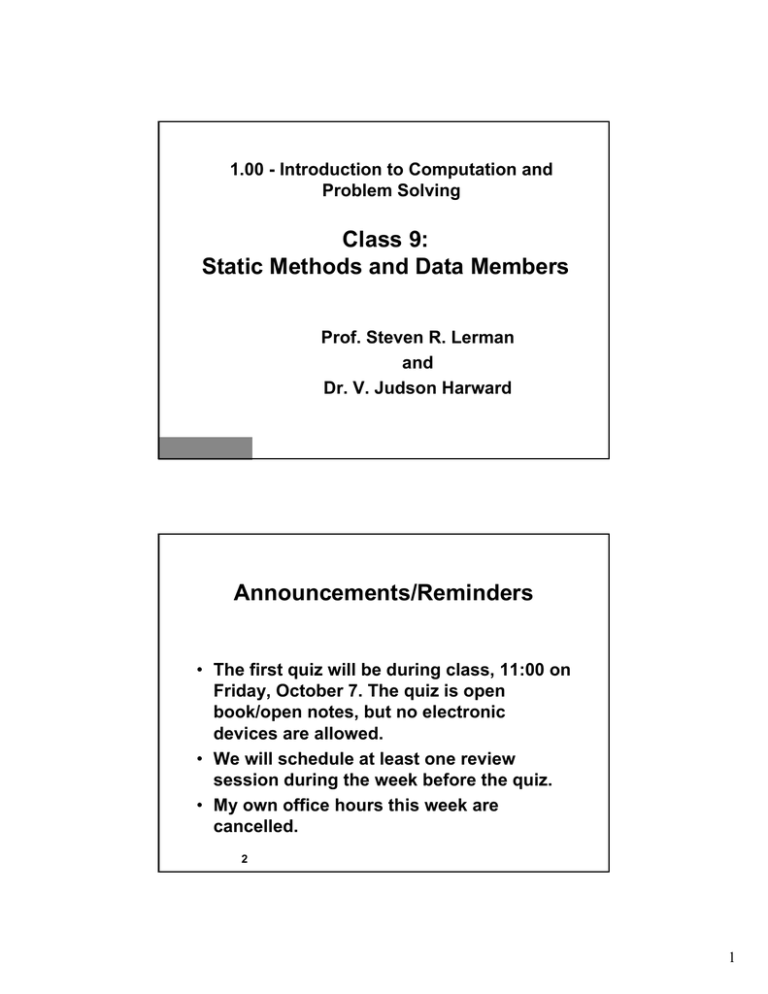
1.00 - Introduction to Computation and
Problem Solving
Class 9:
9:
Static Methods and Data Members
Members
Prof. Steven R. Lerman
and
Dr. V. Judson Harward
Announcements/Reminders
• The first quiz will be during class, 11:00 on
Friday, October 7. The quiz is open
book/open notes, but no electronic
devices are allowed.
• We will schedule at least one review
session during the week before the quiz.
• My own office hours this week are
cancelled.
2
1
Goals
•
•
This the session in which we explain
what static means.
You will learn how to write classes with
static methods and data members.
3
The UnitCircle Program
public class UnitCircle {
public static void main( String [] args ) {
double circum = 2 * Math.PI;
System.out.println(
"Circumference of the unit circle = "
+ circum );
}
}
4
2
Math.PI
double circum = 2 * Math.PI;
• What is Math? Class, object, or method?
How do you know? Can you create Math
instances?
• What is PI? Class, data member, or
method? It's defined as
public static final double PI =
3.14159265358979323846;
– final makes it “read only”
5
Why Math.PI is static data
member
• If PI is a data member, what object does it belong
to?
• We can't create Math instances so it can't belong
to an instance of the Math class.
• Because PI is declared static, it belongs to the
Math class object . Access it using the class
name, not an object reference.
• Yes, even classes are objects.
• How many Math class objects are there in any
Java program? How many PI data members?
6
3
System.out.println()
System.out.println( "Circumference= "
+ circum );
•
•
•
•
What is System? Class, object or method?
Can you create an instance of System?
What is out? Class, object, data member, method?
What is println()? In what class do you think
println() is declared?
• How do you think System.out is declared?
7
System.out
public final static PrintStream out;
• public so that we can print to it from any object
• final so that the user can't replace it
– You can not replace a final object reference, but you can
modify the object referred to. Every time we call
println() we modify out.
• static so that there will be exactly one output
connection to the user's terminal window
• PrintStream because that class has all the right
methods
8
4
Classes Without Instances (Preview)
How do you write a class that can not have
instances?
– Declare it to be abstract
public abstract class NoInstanceClass
{ ... }
9
Classes Without Instances (Preview)
– Make the default constructor private
public class NoInstanceClass {
private NoInstanceClass() {}
}
– If a class has no constructor, Java will supply a
default constructor
– But if you supply any constructor, then Java won't create one.
– If you define only one constructor and make it
private, you can't create an instance outside the
class. (You can “new” an instance inside a class
with a private constructor.)
10
5
When Do static Members get
Initialized?
• Just before they are used. In general the compiler
takes care of this.
• But the compiler can't resolve paradox:
public class Init { // Evil
public static final int i1 = 2*i2;
public static final int i2 = 2*i1;
}
11
static Colors
• Java has a Color class in java.awt package that
we will use extensively when we create graphic
user interfaces.
• The usual way to create a new Color is to use a
constructor that takes a red, green and blue
component:
Color tangerine = new Color( 255, 100, 50 );
• Color also defines certain frequently used colors
as static so you don’t need to create them. For
instance, Color.RED is defined as
public final static Color RED =
new Color(255, 0, 0);
12
6
Summary of static Data Members
• Belong to the class, not an instance of the class
so there is only one copy
• Typically public so you can access them using
MyClass.myStatic
• Often final so they can not be “changed”
• Typical uses:
– Defined constants: Math.PI, Color.RED
– Fixed resources: System.out
– Class-wide values such as counters of instances
13
static Methods
• Most methods are called on an
instance of a particular class.
• static methods are not called on an
instance. Instead they are
conceptually called on the class.
• Methods in Math package (e.g.
Math.pow() are good examples.
14
7
Example Methods
• Why does the Java entry point method
public static void main( String [] args )
have to be static?
• Why is Math.pow( double a, double b )
static?
• Why is int Integer.parseInt( String s )
static?
• Why isn’t the int intValue() method in
Integer static?
• Why isn’t System.out.println( String s )
static?
15
The Syntax of static Methods
• Defining:
// static
public static int parseInt( String s )
// instance
public int intValue();
• Calling:
int ival = Integer.parseInt( "42" );
Integer bigI = new Integer( "42" );
ival = bigI.intValue();
16
8
static Methods Can't Access
Instance Data or Methods
Find the errors (2):
public class StaticError {
private int k;
public StaticError() { k = 42; }
public int getValue() { return k; }
public static void main( String [] args ) {
int k2 = 2*k;
System.out.println( "k= " + getValue() );
}
}
17
Instance or static as a Matter of Style
• Sometimes it is just a matter of style whether you
declare a method to be an instance or a static
method.
• Consider a class Work used for physics and
engineering calculations. The constructor takes 2
arguments, a double and a String indicating the
units of the first argument.
• Remember that a confusion on this issue
between NASA and a contractor led to the loss of
a Mars probe a few years ago.
18
9
class Work
public class Work {
public static final String JOULE = “JOULES";
public static final String LBF = “LBF";
public static final String BTU = “BTUS";
...
private double val;
// in joules
public Work( double w, String units )
{ ... }
}
19
Instance or static, 2
Which is the better way to add two instances of Work?
public static Work add(Work w1, Work w2);
or
public Work add( Work w );
20
10
Instance or static?
• In the Work class,
// returns the value in joules
double toJoules();
Instance
Work w = new Work( 4.3, Work.LBF );
double j = w.toJoules();
21
Instance or static?, 2
• In the Work class,
// returns the conversion factor from
//
unit u1 to unit u2
double getConversion( String u1,
String u2 );
Static
double cf = Work.getConversion(
Work.JOULES, Work.LBF );
22
11
Instance or static?, 3
• In the Arrays class,
// fill the array with val
void fill( int [] a, int val);
Static:
int [] a = new int[ 10 ];
void Arrays.fill( a, 42 );
23
Instance or static?, 4
• In the Date class,
// takes a String date,
// returns milliseconds since 1/1/70
long parse( String s );
Static:
long l = Date.parse(
"9/24/2002" );
Date d = new Date( l );
24
12
Instance or static?, 5
• In the newer DateFormat class, which represents
a particular way of formatting dates, e.g., US
9/24/2002 vs. European 24/9/2002
// takes a String date,
Date parse( String s );
Instance:
// gets default local DateFormat
DateFormat df =
DateFormat.getDateInstance();
Date d = df.parse( "9/24/2002" );
25
Static Members Exercise
• Using your browser, navigate to
the lecture notes section
and download Lecture9JavaFiles.zip.
• Double click on the file you
downloaded and extract it. It will unpack
into a new subdirectory call
Lecture9JavaFiles.
• You will see a single Java file and a
README.pdf file that has instructions for
this exercise.
26
13
